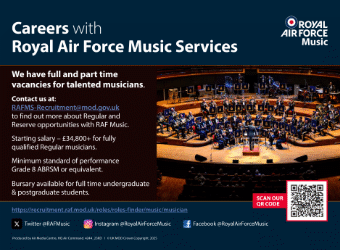With the announcement of Eric Ball's 'Indian Summer' as the set-work for the 2026 Fourth Section Regional Championships quickly becoming a depressingly vitriolic social media display of misunderstanding, Edward Gregson's 'Partita' and the performances that it inspired from the 17 National Final contenders at Cheltenham on Sunday morning was a prescient reminder of appropriateness inspiring excellence.
Written in 1971 at a time when the composer's progressive explorations were beginning to emerge in exciting new directions, it has retained its relevance ever since — the trio of movements combining musical adventurism with academic rigour.
Absorbing test
The competitors and their conductors found it an absorbing test — none quite mastering it in full, but the vast majority providing performances of rich merit, and all benefitting from the experience.
They were led by the new champion, Arbroath & Carnoustie conducted by Neill McDonald.
Originally formed in 1893, as Arbroath Instrumental, since 2022 they have been linked to Carnoustie (whose fine youth band has provided many players over the years) to become renewed, revitalised and now resplendently crowned as Champion Band of Great Britain.
Drawn on the cusp of the contest comfort break, their impressively delivered 'Partita' balanced the sombre seriousness of the opening 'Intrada' with the lyrical variant explorations of the central 'Chorale & Variations' and the upbeat optimism of the closing 'March' to secure a deserved victory.
It saw the National title head back to Scotland for only the third time in over half a century, emulating the feat of another, now defunct Angus based band, RNR Dundee, who were based just 17 miles away, way back in 1973.
Hugely impressive
The future for this band though looks to be hugely impressive, after producing a winning performance described by the judges Alan Bourne, David Hirst and Steve Pritchard-Jones in their written remarks as one "that showcased the band's strengths... with lots of clear detail noted", with "much to commend" and "well prepared".
Those points echoed much of what Alan Bourne had earlier highlighted in what the trio were looking for in the spacious confines of the 'box' — with the MDs appreciation of what he called "the fundamental basics at its core" — from the opening statement to the very end, captured with considerable aplomb.
The immediate celebrations were marked by a joyful outpouring of emotion: "We've only gone and done it!! British Champions", they said on their Facebook page.
By the time they had made the long trip home fuelled by the memories of a fantastic achievement under their inspirational MD, their local Angus & Dundee newspaper had picked up on it too. Their headline told everyone: "Band strikes right note to claim glory".
On this form there may be yet more to come in the years ahead.
Impressive Queensbury and Darwen
So too for runner-up Queensbury Music Centre, who very nearly repeated the success achieved at this event way back in 1976 after delivering a wonderfully constructed rendition under MD Chris Lewis. Just a few too many moments of fragility saw them miss out on the title. It was a thoroughly impressive performance though.
The final podium spot went to another band with a title at this level to their name. Darwen won in 1979 and would have bene confident of repeating that after providing the judges with the imposing early marker under the vastly experienced MD David W Ashworth. It was also a boldly delivered performance of considerable note.
Delight
At the other end of the experience range, there was delight for Red Admiral as the national final debutants secured a fine fourth place finish (aided by the 'Most Outstanding Player' contribution of cornet player, Joseph Glew) ahead of solidly delivered early draw contenders of City of Oxford Silver and Brackley & District.
Each will have been delighted with their efforts: Red Admiral's confidence growing after a bumpy start, City of Oxford giving each movement a strongly characterised identity and Brackley & District also developing a performance led and delivered with understanding.
Lots to admire
Lots to sit back and admire too with the host of closely matched top-10 finishers, led by a fine number 1 marker provided by the Welsh contenders of Holywell ahead of the well-constructed accounts from Stranraer, Friendly Band (Sowerby Bridge) and Syston.
After that the bands were challenged by the 'fundamental basics' that Alan Bourne referred to, as the opening 'Intrada' demanded ensemble cohesion and balance, the central movement, stylistic variance, and the 'March', gradings in pace and dynamic.
All though emerged in credit, with consistency of execution and some intonation troubles making the difference in what were a series of thoroughly enjoyable performances from Illogan Sparnon down to Knaresborough Silver, whose 9-year-old player Elizabeth gave the best smile of the day in receiving the 'Youngest Plyer of the Day' award.
Iwan Fox
It saw the National title head back to Scotland for only the third time in over half a century, emulating the feat of another, now defunct Angus based band, RNR Dundee, who were based just 17 miles away, way back in 19734BR
Result:
Fourth Section:
Partita (Edward Gregson)
Adjudicators: Alan Bourne; David Hirst; Steve Pritchard-Jones
1. Arbroath & Carnoustie (Neill McDonald)
2. Queensbury Music Centre (Chris Lewis)
3. Darwen (David W Ashworth)
4. Red Admiral (Stuart Barton)
5. City of Oxford Silver (Douglas Brown)
6. Brackley & District (Mark Probert)
7. Holywell (Steve Pugh-Jones)
8. Stranraer (Angela Miller)
9. Friendly Band (Sowerby Bridge) (Mick Silson)
10. Syston (Alex Bland)
11. Illogan Sparnon Silver (Shaun Marsden)
12. Cobham (Will Wilkins)
13. Ireland Colliery Chesterfield (Sarah Fellowes)
14. Wantage Academy (Nikki Jones)
15. Midsomer Norton & Radstock Silver (Harry Chambers)
16. Tewit Community (Andrew Williams)
17. Knaresborough Silver (Nicholas Garrett)
Most Outstanding Player: Joseph Glew (cornet) — Red Admiral
Youngest Player: Elizabeth (aged 9) — Knaresborough Silver



















